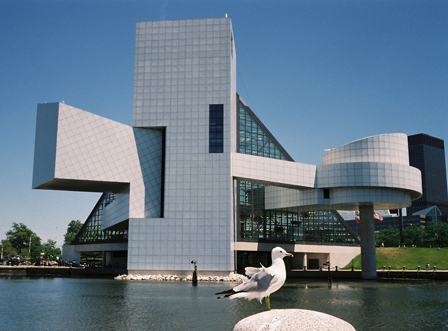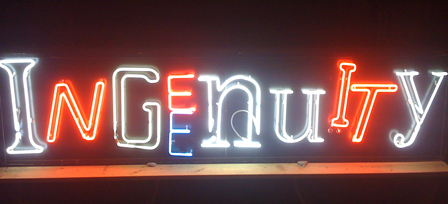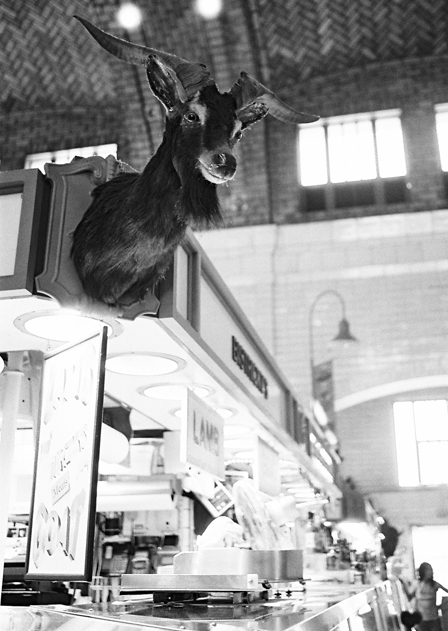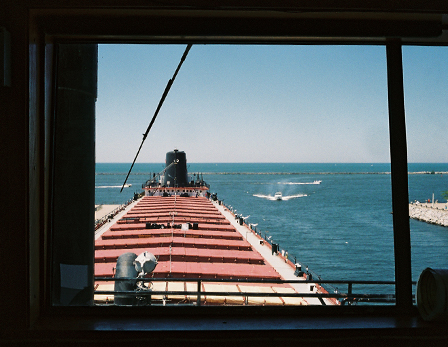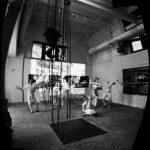People often ask me, “Why Cleveland?” It seems that there is a strong polarity in people’s thoughts about this city — either they remember that many decades ago its river caught on fire (though, from what I understand, this was not entirely uncommon for industrial cities at the time) and that it’s been in decline for awhile, or they are die-hard Cleveland fans and paint an oh-so-sweet picture of it as a small town with a great work ethic. I’m not saying that either of those things is totally inaccurate, but I do think an apt picture of present-day Cleveland has yet to be painted. Perhaps that’s because it’s still morphing into what it will be.
I’ve been living here again since August 1, 2011. I grew up here, and while a lot of the infrastructure remains the same, this is a vastly different place than the place I grew up. After a year and half, the vibe is really starting to sink in. I’m meeting some amazing entrepreneurs running creative businesses like the entire gang at the Firehouse in Hinge Town — Rising Star Coffee, Urban Orchid, and North Water Partners; Aperture: A Photography & Variety Store in Tremont; Go Media and ShiShi Events in Lakewood; and the Sawyer family’s ever-growing downtown-centric enterprise — including Noodlecat, Greenhouse Tavern, and now Tavern Vinegars. It is an amazing time to start a business here, as the world realizes the importance of a central city space, and so many gorgeous and historic places are vacant and primed for development and creation.
Glimpses of an abundant attitude have started to surface, where there is a long-standing history of a primarily working class population. But, more often than makes me comfortable, I bump up against an old scarcity attitude that seems to reveal that working class history. Despite the fact that many of the offenders are middle class people with a suburban upbringing, there is a protective feeling of holding one’s cards close to one’s chest as if everything could be stolen from you at any minute, of frowning upon taking risks, upon growth and change. What is particularly frustrating is that many of the people who have brushed against me in this way think that they stand for the opposite — they think they are somehow “doing good” for Cleveland by adopting an attitude of “we don’t need any [more] of that here.”
I have also found, very sadly, that while many people are eager to support talent, there are also many people who seem frightened of it. I once attended a networking event that was specifically geared towards positive-oriented socializing, and another photographer came up and said, “Look, just so you know, this group is my territory.” This came as quite a shock having worked in New York for 10 years, where there seem to be 20 photographers per block, and where we would pride ourselves on the fact that we’re all different and that there’s something for everyone.
In speaking with another local business owner, he confessed trying to pool together the other leaders in his industry to cultivate a fresh culture around their product. To me, this sounded innovative — like a way to make Cleveland known for its excellence in a particular field, to build a love for it, and therefore generate more customers for all businesses in that category. Alas, he was met with resistance; the other leaders were fearful that by sharing with others, they would have their clients stolen away. Sadly, this small thinking will keep Cleveland just that — small.
Not that small is necessarily bad. Lots of good things come from small. It’s why I love to shop local, and spend money where a small purchase makes a big difference, like giving a young woman, such as the owner of Lilly Chocolates, a chance to support herself and her family through a craft that she loves. However, in my business there is a certain threshold of productivity that has to be met regardless of the work load — and once that’s met, I can actually achieve a great deal more without having to increase the work load by much. I would assume this is true of all industries. And, so what is there to fear about growth? This is a deep question, and one I have struggled with myself at various times. Something in our ego tells us, “Play safe, play small, do what you know.” Even though what I want, what Cleveland wants, is the increased prosperity that will only come from growth.
Then, there are the basic things like not returning emails or phone calls efficiently, not knowing proper email etiquette, or lack of a well-developed website that have prompted me to find alternatives to doing business locally. Even though supporting a local business is my first choice, it isn’t always possible if the company fails to deliver what I am hoping for, when I need it. Yet, it’s not as though this city lacks the internet or social media or the news. It’s as if Clevelanders got the memo that the world is moving faster now, but they are choosing to ignore it. I want Cleveland to be a world-class city, and that means its businesses are going to have to learn to keep up. If you want to learn more about the importance of a website, or email etiquette, there is a wealth of information available online — exercise your googling skills! (Or click the links I provided here for just a taste of what’s out there.)
The present education system, geared towards creating excellent factory workers doing repetitive tasks that never change, is doing a poor job of preparing our young work force for the skills they need to constantly learn and keep up with the fast-moving pace of technological and business development these days. I am a big fan of Sir Ken Robinson, who is famous for his TED talks, and who speaks of the limitations of the old educational ways. He thinks that those of us thriving today are doing so in spite of our education, not because of it. Luckily, by the power of google and the wealth of information available on the internet, we are primed better than ever before to self-educate, and to find the resources we need to find help getting educated in areas we struggle with on our own.
What I love about Clevelanders is the size of their hearts. They are loyal to a fault. I think that with hearts and heads aligned in the right place, people here have more potential than elsewhere, because they do, in fact, have one of the best work ethics I’ve seen in any of my travels to cities of the world. Continuing education, and helping people see a more positive way of viewing risk-taking and growth, are going to be crucial towards getting Cleveland’s head in the right place. My friend and inspiration, Louis Alloro, is leading a series of workshops geared towards this head-space. It’s called SOMO — social emotional leadership. If you’re in Cleveland, or any city recovering from a long-standing decline, I highly recommend checking out and implementing this technique in your personal life, and in your community. You can attend one of Louis’s Cleveland workshops for free — just stay tuned to the facebook page for info.
Growth terrifies your ego. That’s why you’ve got to lead with your heart. There’s a quote in the Talmud that states, “Every blade of grass has its angel that bends over it and whispers, ‘Grow, grow.'” Cleveland’s got a whole lot of these angels bending over it now. We just need to be better about holding our community accountable. Do we want to heed the fearful voice that tells us to play small, hoard energy and resources, tell others we’re unwilling to collaborate? Or, do we want to heed the gentle, persistent call to grow?
I know what I want for Cleveland. I know it won’t be easy for a lot of egos. But I also know that when egos fall away, there’s love left standing, and that’s stronger than any ego could ever be. I feel that love pulsating here, and I want to see it take over.
